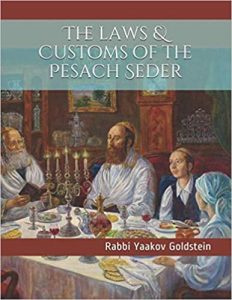*As an Amazon Associate I earn from qualifying purchases.
The Mishneh[3] states that it is forbidden to be Maftir after the Afikomen. This means that one should not conclude the eating of the Pesach sacrifice with Afikomen.[4] (The term Afikoman means to bring Mezonos and food to the table.[5]) Thus [the phrase of “We are not Maftir after eating the Pesach with an Afikoman”] means to say that after eating the Pesach lamb we do not eat any type or form of food or produce that exists in the world.[6]
_______________________________________________________________[1] Rambam 10:11; See Karban Pesach Kehilchaso 152; 157-160
[2] Admur 477:2; Rambam Pesach 8:9; Shmuel Pesachim 119b; See Kaf Hachaim 478:2; See Karban Pesach Kehilchaso 151
[3] Pesachim 119b
[4] The term Maftirin here comes from the word Yaftiru Besafa, which means to open the mouth and as. Alternatively, it comes from the word Niftar Meichaveiro, which means to depart, and hence it is saying that one should not depart from the Pesach with Afiokoman. [Levush 478; P”M 478 M”Z 1; Kaf Hachaim 478:2]
[5] Admur ibid
Other interpretations: Some say that the word Afikoman means Afiku Mani, which is to say that one should not ask [i.e. Maftirim] for dessert [i.e. Afikoman] after eating the Pesach sacrifice. [Levush 478; P”M 478 M”Z 1; Kaf Hachaim 478:2]
[6] The reason: After eating the Pesach sacrifice it was forbidden to eat any other food and produce in the world in order so its taste not be removed from ones mouth through the taste of another food. [Admur 478:2; Rambam Pesach 8:9; Shmuel Pesachim 119b]




Leave A Comment?
You must be logged in to post a comment.